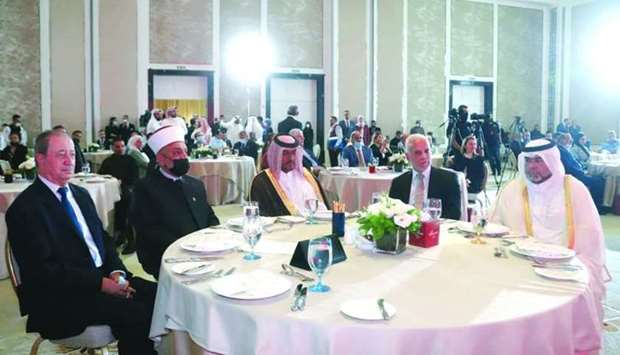Qatar Charity (QC) opened an office in Jordan at a ceremony attended by HE Sheikh Hamad bin Nasser bin Jassim al-Thani, Minister of State and chairperson of Qatar Charity; Ayman Mufleh, Jordan’s Minister of Social Development; Dr Mohamed al-Khalaileh, Minister of Awqaf, Islamic Affairs and Holy Places in Jordan; and Yousef Ahmed al-Kuwari, CEO of Qatar Charity, in addition to many members of the diplomatic corps in Jordan and other dignitaries.




During the ceremony, HE Sheikh Hamad presented honorary shields to QC's partners in Jordan, notably the Jordan Hashemite Charity Organisation (JHCO), Jordanian Hashemite Fund for Human Development (JOHUD), King Hussein Cancer Foundation and Arabian Medical Relief (AMR).
Jordan's Minister of Social Development said the inauguration of the office reflects the deeply rooted relationship between the two countries, which is characterised by love, respect and brotherhood, and is the culmination of the directives of Abdullah II Ibn al-Hussein, King of Jordan, and His Highness the Amir Sheikh Tamim bin Hamad al-Thani to strengthen co-operation between the two countries.
He added that Jordan's policy in dealing with refugee crises stems from the well-established national principles on which the Kingdom was founded, and from the moral and humanitarian responsibility towards them. “We are moving forward despite the scarcity of resources, economic pressures and the consequences and effects of the Covid-19 pandemic,” he noted.
The ambassador of Qatar to Jordan, Sheikh Saud bin Nasser bin Jassim al-Thani, thanked the Government of Jordan for facilitating the opening of QC’s office in Jordan. He said this co-operation between the two brotherly countries is an extension of the recent meeting between the two leaders, His Highness the Amir Sheikh Tamim bin Hamad al-Thani and Abdullah II Ibn al-Hussein, King of Jordan, in Qatar.
He also stated that Qatar Charity will provide humanitarian services across the Kingdom. Al-Kuwari, on his part, said QC was quick to stand by Jordan, whether in the camps or in the communities and regions hosting refugees, as part of its keenness to contribute to alleviating the suffering of Syrian refugees and lessening the burdens of the countries of asylum, especially Jordan in light of its limited resources.
He praised the efforts of Qatar Charity’s representation in Jordan, which was established in 2016, in further advancing the relief work through the programmes, projects and assistance, in addition to sponsoring more than 5,000 orphans from refugee families and vulnerable Jordanian households.
Speaking at the ceremony, al-Kuwari announced the opening of QC’s Jordan office after obtaining official licences, indicating that this is part of Qatar Charity’s plan to expand and develop its work and increase the volume of its relief and developmental interventions to meet the challenges associated with humanitarian action. He also looked forward to implementing more qualitative projects in various fields.
In closing, al-Kuwari thanked the Jordanian government for extending all the support to QC to implement humanitarian and developmental programmes in Jordan, appreciating the continued efforts and co-operation of the partners. He extended sincere thanks to the ambassador of Qatar for his continuous co-operation and support.
Qatar Charity has more than 30 offices globally that enable it to directly supervise its projects and implement its urgent humanitarian interventions.
Jordan's Minister of Social Development said the inauguration of the office reflects the deeply rooted relationship between the two countries, which is characterised by love, respect and brotherhood, and is the culmination of the directives of Abdullah II Ibn al-Hussein, King of Jordan, and His Highness the Amir Sheikh Tamim bin Hamad al-Thani to strengthen co-operation between the two countries.
He added that Jordan's policy in dealing with refugee crises stems from the well-established national principles on which the Kingdom was founded, and from the moral and humanitarian responsibility towards them. “We are moving forward despite the scarcity of resources, economic pressures and the consequences and effects of the Covid-19 pandemic,” he noted.
The ambassador of Qatar to Jordan, Sheikh Saud bin Nasser bin Jassim al-Thani, thanked the Government of Jordan for facilitating the opening of QC’s office in Jordan. He said this co-operation between the two brotherly countries is an extension of the recent meeting between the two leaders, His Highness the Amir Sheikh Tamim bin Hamad al-Thani and Abdullah II Ibn al-Hussein, King of Jordan, in Qatar.
He also stated that Qatar Charity will provide humanitarian services across the Kingdom. Al-Kuwari, on his part, said QC was quick to stand by Jordan, whether in the camps or in the communities and regions hosting refugees, as part of its keenness to contribute to alleviating the suffering of Syrian refugees and lessening the burdens of the countries of asylum, especially Jordan in light of its limited resources.
He praised the efforts of Qatar Charity’s representation in Jordan, which was established in 2016, in further advancing the relief work through the programmes, projects and assistance, in addition to sponsoring more than 5,000 orphans from refugee families and vulnerable Jordanian households.
Speaking at the ceremony, al-Kuwari announced the opening of QC’s Jordan office after obtaining official licences, indicating that this is part of Qatar Charity’s plan to expand and develop its work and increase the volume of its relief and developmental interventions to meet the challenges associated with humanitarian action. He also looked forward to implementing more qualitative projects in various fields.
In closing, al-Kuwari thanked the Jordanian government for extending all the support to QC to implement humanitarian and developmental programmes in Jordan, appreciating the continued efforts and co-operation of the partners. He extended sincere thanks to the ambassador of Qatar for his continuous co-operation and support.
Qatar Charity has more than 30 offices globally that enable it to directly supervise its projects and implement its urgent humanitarian interventions.

